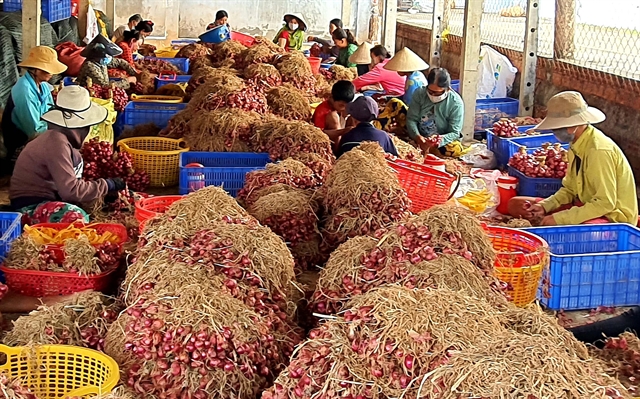 Society
Society

The Cửu Long (Mekong) Delta province of Sóc Trăng is promoting the development of the collective economy in all sectors with a focus on production efficiency and quality.

|
| Farmers treat Vĩnh Châu red onions, a speciality of Sóc Trăng Province’s Vĩnh Châu Town, before selling them. – VNA/VNS Photo Trung Hiếu |
SÓC TRĂNG – The Cửu Long (Mekong) Delta province of Sóc Trăng is promoting the development of the collective economy in all sectors with a focus on production efficiency and quality.
The province has an estimated 1,336 co-operative groups and 231 co-operatives operating effectively in various sectors, but with a majority in agriculture, according to its Party Committee.
The co-operatives are expected to have revenues of more than VNĐ4.5 billion (US$198,000) each on average this year, up VNĐ3.66 billion from 2001.
Their profits are expected to be VNĐ230 million ($10,100) and their members will have an annual income of VNĐ12 million ($530), VNĐ2 million ($90) higher than in 2001.
Huỳnh Ngọc Nhã, director of the province Department of Agriculture and Rural Development, said the collective economy has played an important part in fostering socio-economic development, especially agriculture.
The development of co-operatives and co-operative groups has enabled the production of large volumes of products and improvement in quality for both domestic consumption and exports, he said.
Yet, the development has not been commensurate with potential, according to the province Party Committee, with many co-operatives having poor management and lacking sufficient infrastructure for operations and linkages with companies for production and distribution of their products.
The collectives are expected to account for only about 0.13 per cent of the province’s economy this year.
Lâm Văn Mẫn, Secretary of the province Party Committee, said besides the Government’s policies for developing the collective economy, the province too has support policies.
It would promote its co-operative support fund and help co-operatives obtain soft loans for expanding their production and businesses, he promised.
It would help expand efficient co-operatives, develop linkages between them and companies to acquire advanced techniques for production and secure outlets for their output.
The province has 20 items made by 15 co-operatives that have been recognised as three – star and four-star OCOP products under the national ‘one commune – one product’ programme.
Agricultural co-operatives
As an agrarian province having a coastline of 72km, it has advantages for developing the cultivation of rice and fruits and aquaculture.
It has 54 agricultural co-operatives and 371 agricultural co-operative groups growing rice, fruits and vegetables that have tied up with companies.
The Thành Công Grapefruit Co-operative in Kế Sách District meets Vietnamese good agricultural practices (VietGAP) standards to enable exports and has a total area of 37.3ha with an annual output of 746 tonnes.
Lê Văn Phải, its director, said local agencies have provided training to the co-operative’s managing staff in applying VietGAP standards.
In 2019 it exported more than 60 tonnes of grapefruit to the EU, and each of its members earned an income of VNĐ210 million ($9,260).
Last year the province Management Board for Speciality Fruit Development brought the VinaGreenco Joint Stock Company from Cần Thơ City to buy 132 tonnes of grapefruit from the co-operative.
Thành Công members also grow the fruit in the off-season to sell at higher prices.
Their green skin and pink flesh grapefruit and Năm Roi grapefruit were recognised as four-star OCOP products last year.
Most members of co-operatives across the province have received training in advanced farming techniques and benefited from a reduction in production costs and higher selling prices since their co-operatives buy inputs in large quantities and they are guaranteed outlets with steady prices.
Ngô Công Luận, director of the 14/10 Agriculture Fisheries Co-operative in Mỹ Xuyên District, said the collective economy helps producers get information and learn from others’ experience.
The experience is one of the factors that help producers reduce costs, increase incomes and meet the requirements of the market, he said.
14/10’s members have been trained by the World Wild Fund for Nature in Việt Nam and the International Centre for Aquaculture and Fisheries Sustainability in breeding shrimp to Global Aquaculture Stewardship Council (ASC) standards to enable exports to the EU, he added. – VNS




